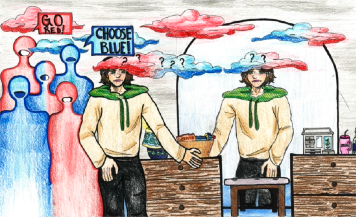As a teenage girl, I’ve watched my fair share of romantic-comedies. I was first exposed to these movies when my mom would watch them in the living room and graduated to streaming them on my phone. Maybe it’s only because I’m interested in journalism, but I started to pick up on a common theme: so many of the main characters were writers for a newspaper or editors for a magazine, and much of the plot revolved around this journalistic pursuit. Now, I’m not here to hate on journalism (that would be a little hypocritical), but I think it’s a little odd. Out of so many desirable careers, why do so many rom-coms revolve around journalism?
Although a lot of the movies are similarly set, they’re often different in the specific roles the characters take on in the journalism industry. In How to Lose a Guy in 10 Days, for example, Andie Anderson writes for the women’s magazine Composure, but in 27 Dresses, Kevin Doyle writes for a newspaper. In 13 Going On 30, Jenna Rink is an editor for fashion magazine Poise, but in The Proposal, Margaret Tate is the editor-in-chief of a book publishing company. In The Devil Wears Prada, Andy Sachs doesn’t write herself, but is the assistant to the editor-in-chief of fashion magazine Runway. In all of these movies, the characters have widely different positions in the journalism realm, from assistant to editor-in-chief. So if it’s not one specific role at one specific type of publication, it’s journalism as a whole that’s common in these movies. But, I’ve often wondered, why? Maybe it’s just the romanticized atmosphere of big offices and deadlines and papers scattered around, but I feel like it’s deeper than that.
With the whole point of a movie being to tell a story, I think it’s a cool concept how the characters are focusing on their own stories within a story. As they’re navigating how to write their articles, like in 27 Dresses or How to Lose a Guy in 10 Days, their own character and plot is being developed. This pursuit-of-the-truth-inception brings a level of depth to the movie and creates a natural way for the plot to advance, with deadlines and bylines and such. And for the audience, this journalism-rom-com duo can bridge the gap between different forms of media that people may be interested in, like books or magazines.
Another factor that makes journalism the perfect movie career is the demanding time schedule it places on the characters. Busy characters set up the plot perfectly for different romance tropes, such as the love interest that’s “hidden in plain sight” or “right in front of them the whole time.” With characters buzzing around trying to meet a deadline, the audience can get the satisfaction of seeing a romance brewing before the characters do. And of course, when characters are forced to be together often, it facilitates feelings. This is convenient, but I still don’t think it’s the primary aim of the chosen professions.
I think that the main purpose, whether intentional or not, of setting rom-coms in the world of journalism is to give the characters power. Let’s face it, rom-coms are not typically regarded as the most sophisticated or societally impactful forms of media. They’re usually seen as lighthearted and frivolous. Journalists, though, are thought of as key figures in an educated society, and are respected for that. When a main character has a voice, it gives them the credibility needed for the audience to fully invest in them and appreciate the lessons that the character is learning throughout the movie. Making the characters writers or editors adds seriousness and maturity to the plot, which offsets any shallow preconceptions that the audience might have or any stereotypes associated with romance movies.
So while it may just be that the writers of rom-coms are (shocker) writers just writing about a world they know, I think that, at least subliminally, they’re trying to accomplish something greater. These movies are showing viewers that love can have a place in the professional world and romantic feelings can be a sign of maturity, not frivolity. It gives rom-coms value and substance, which results in a well-rounded movie. It encourages young viewers (like myself) to aim high in life and to not shy away from power. It teaches people that love does not discount professionalism, nor the other way around. It’s a greatly impactful choice, which is why journalism is so prevalent in rom-coms.






